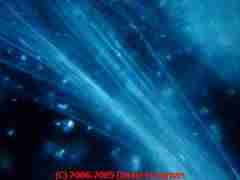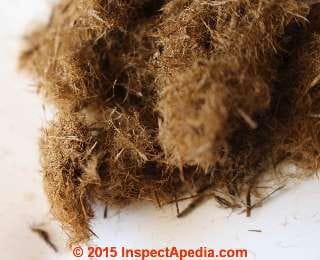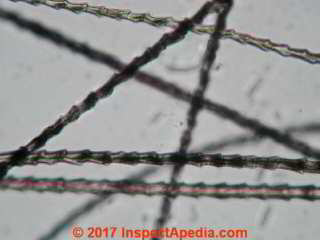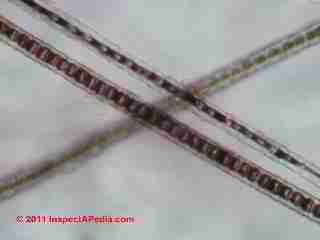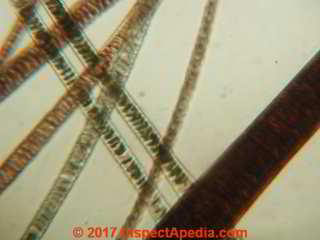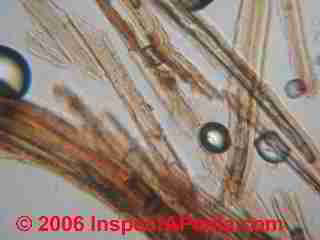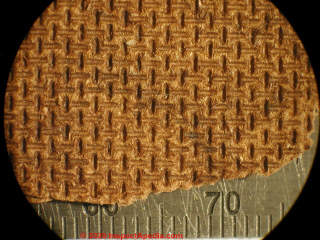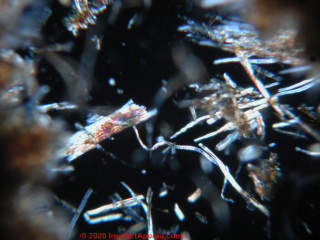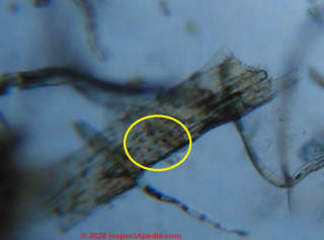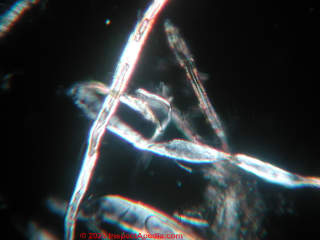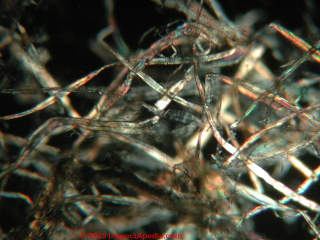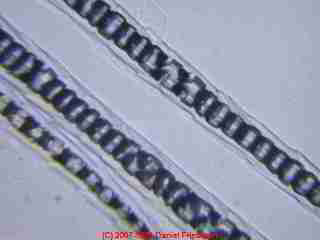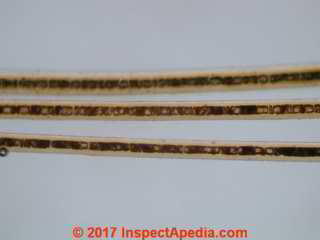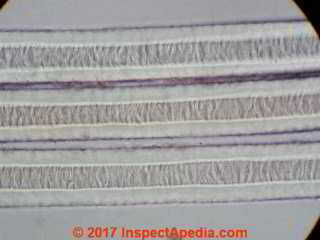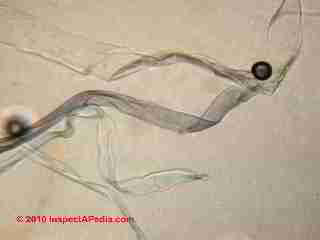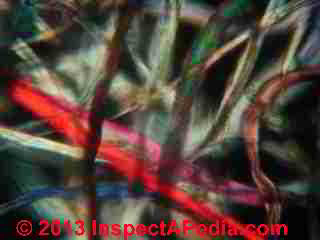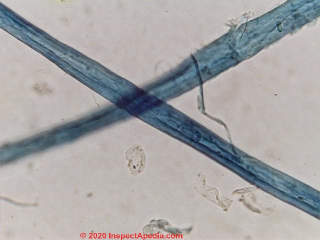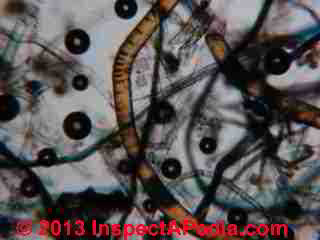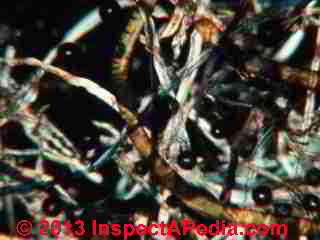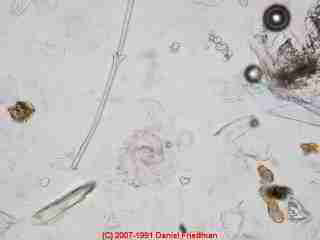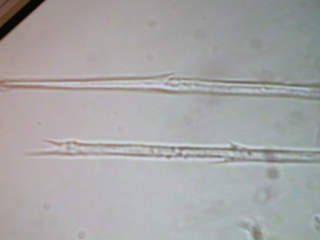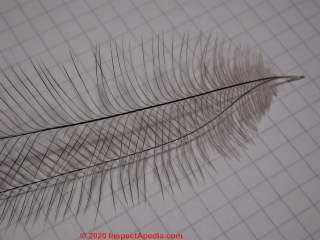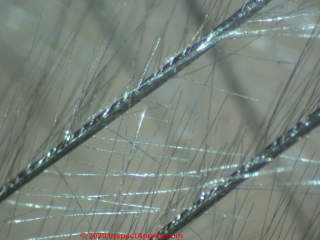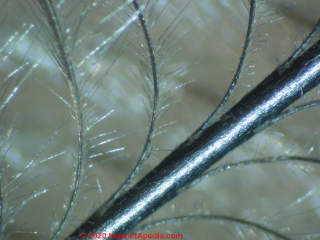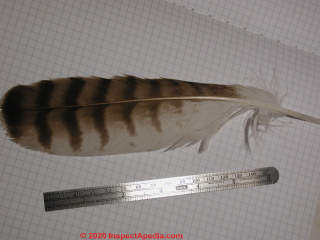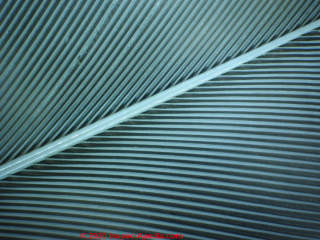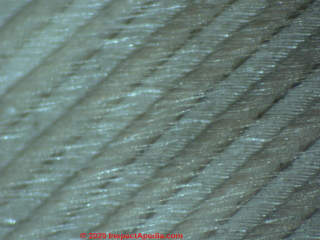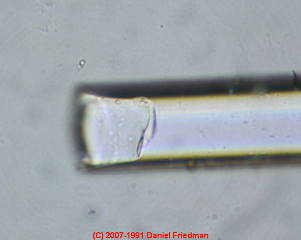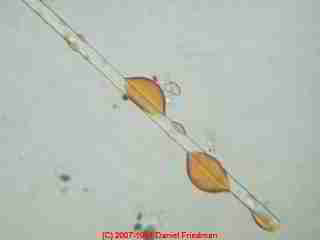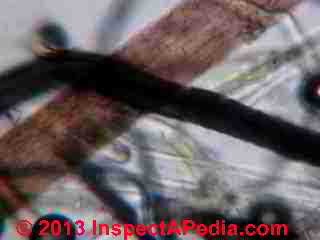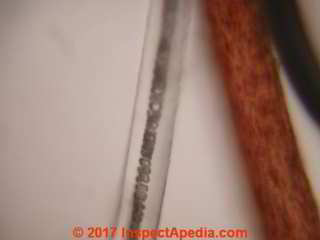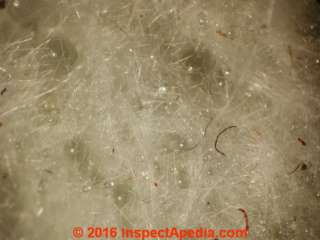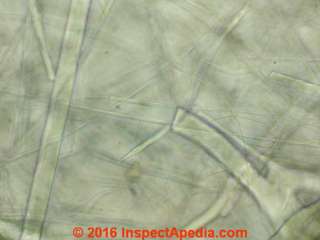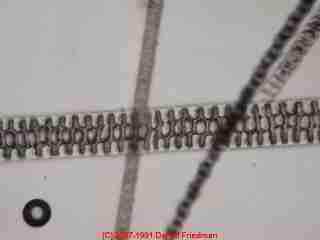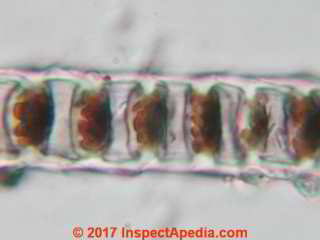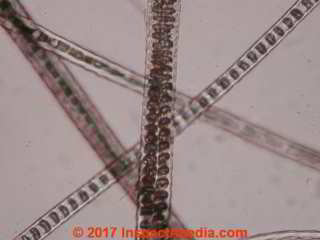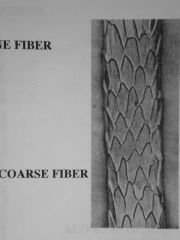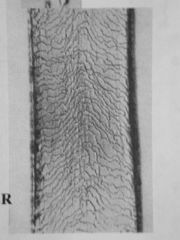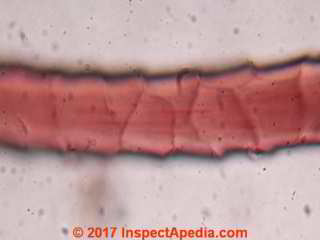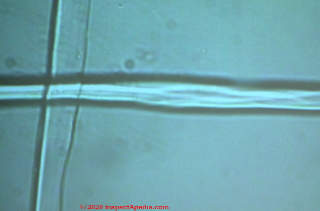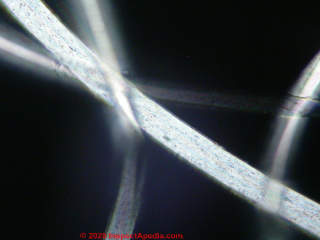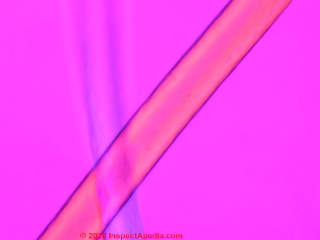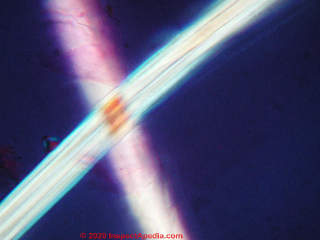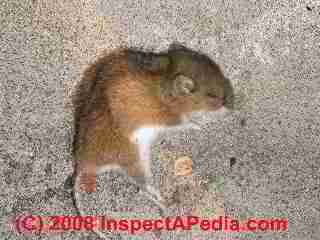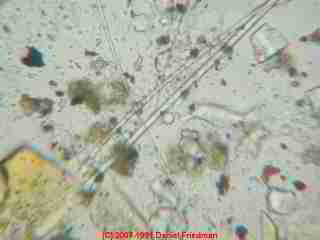 Fiber & Hair Identification Photos
Fiber & Hair Identification Photos
Index to hair & fiber information, microscopy lab photos & more
- POST a QUESTION or COMMENT about this article topic.
Hair & Fiber identification in buildings, in building materials, or in dust or particle samples:
Here we provide photos of common hairs and fibers found in buildings along with links to related articles giving more information about each of those hair or fabric topics.
This article series describes methods and equipment useful for the identification of human or animal hair in buildings or in building air or dust samples, and for the identification of other fibers in building dust samples such as fabric fibers, insulation fibers, and fiberglass or asbestos.
Page top photo: fiberglass fibres identified in an indoor dust sample.
InspectAPedia tolerates no conflicts of interest. We have no relationship with advertisers, products, or services discussed at this website.
- Daniel Friedman, Publisher/Editor/Author - See WHO ARE WE?
Fiber & Hair Identification & IAQ Information
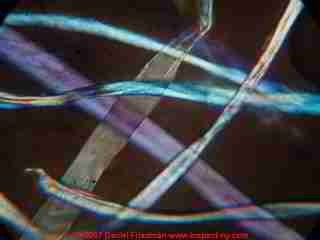
Following this sampler of photographs giving examples of various hairs and fibres found in or around buildings we include an index to InspectApedia articles giving additional technical depth on microscopic or other techniques for hair and fiber identification and for the control of indoor air quality, health, and allergic hazards associated with fiber and hair.
To find what you need quickly, if you don't want to scroll through this index you are welcome to use the page top or bottom SEARCH BOX to search InspectApedia for specific articles and information.
Photo just above: several types of fabric fibers in polarized light.
[Click to enlarge any image]
Article Contents
- ASBESTOS Identification by Microscope
- BALSAM WOOL Identification by Microscope
- BAT HAIR Identification by Microscope
- CAT HAIR Identification by Microscope
- CELLULOSE, WOOD, PLANT Identification by Microscope
- CHINCHILLA HAIR Identification by Microscope
- DOG HAIR Identification by Microscope
- FABRICS Identification by Microscope
- FEATHER Identification by Microscope
- FIBERGLASS Identification by Microscope
- HORSE HAIR Identification by Microscope
- HUMAN HAIR Identification by Microscope
- MINERAL WOOL / STONE WOOL / SLAG WOOL Identification by Microscope
- MOUSE HAIR Identification by Microscope
- RABBIT HAIR Identification by Microscope
- SHEEP HAIR WOOL Identification by Microscope
- SILK FIBRES Identification by Microscope
- SYNTHETIC FIBRES - DACRON FIBRES Identification by Microscope
Asbestos Identified Under the Microscope
Above: a lab photo we took of Tremolite asbestos fibers.
See
ASBESTOS PHOTO GUIDE to MATERIALS
Balsam Wool Insulation Identified Under the Microscope
Photo above: balsam wool type building insulation discussed
at BALSAM WOOL BATT INSULATION
Also see
MICROSCOPIC EXAMINATION OF CELLULOSE INSULATION
Bat Hair Identified Under the Microscope
Also see
ANIMAL BITES & SCRATCHES - BATS
Cat Hair Identified Under the Microscope
Photo above: cat hair under the microscope.
See
Cellulose Fibres Identified Under the Microscope
This is a very large group, including as examples various plant fibers (cellulose) for which we give just a few examples here, starting with wood fibres, typically fir, used to produce Masonite and similar hardboards, and possibly Australian hardboard produced using eucalyptus wood.
Above: Masonite™ fragments (wood fibres) isolated from a surface sample of an oil painting that was executed on a hardboard substrate.
At PAINT FAILURE, DIAGNOSIS, CURE, PREVENTION we explain why tempered hardboard may suffer brown bleed-through staining when painted if it is not properly sealed first.
Below: Australian hardboard used as a painting substrate, discussed in detail at
HARDBOARD MASONITE™ & OTHER BRANDS where we include a discussion of art, paintings on hardboard.
Below: evidence that this Australian hardboard may have been manufactured from Eucalyptus wood.
Also see
SHEATHING, FIBERBOARD ASBESTOS CONTENT
and for a rather different example of plant fibres examined under the microscope
see PAPAYA WHITE GROWTH vs DISEASE
Below: cellulose building insulation (paper) fibres examined under the microscope in polarized light.
Below: wood fibers mixed with cellulose (*paper fragments) from an insulation sample from a home in Tuolumne County, California and described
at MICROSCOPIC EXAMINATION OF CELLULOSE INSULATION
Chinchilla Hair Identified Under the Microscope
Dog Hair Identified Under the Microscope
The photos below show hair from a golden retriever (Gunner, Haddonfield New Jersey) under the microscope - well the hair was under the microscope, not Gunner himself.
See also ALLERGENS in BUILDINGS - home
Fabric Fibers Identified Under the Microscope - Animal, Natural, Plant, Synthetic
Fabric fibres incude both inorganic such as fiberglass and mineral wool and organic such as fabrics made from plant or animal fibres or hair.
Below: cotton fabric fibres under the microscope.
Above our two photographs show the dominant particles in dust samples from a home under study. Magnified to 720x the fibers we found were primarily cotton, with some linen and a few synthetic fabric fibers.
Above and below, photos from vacuumed house dust sample collected in a U.K. home (London) show synthetic and natural fibres. Fabric or carpet fibres made up a significant portion of the sample volume.
Below the fibres are shown in polarized light.
These fabric fibers and the dust from a London home are discussed
at
Also see
Feathers & Feather Barbules Identified Under the Microscope
Photo above: fragment from a feather - a barbule, on a background of animal dander and other debris in an indoor dust sample.
Below are details of an isolated feather barbule examined while at McCrone Research.
We have examined the details of feathers from several birds, including a Blue Jay, Cardinal, Cassuary Feather, Downy Doodpecker, Pigeon, Red-Tailed Hawk, Wild Turkey feather. Some of these are shown below.
Below: Details of a Cassuary feather.
...
Below: details of a feather from a Red Tailed Hawk found by the author.
...
...
Fiberglass fibres Identified Under the Microscope
Above: characteristic concoidal fracture at the end of a fiberglass fragment or fibre.
Our second photo, below, of fiberglass fibres above illustrates the presence of a resin binder common in most fibreglass inslulation products. The colour of the binder resin gives colour to the insulation and often can be used to identify the fibreglass brand.
See
- FIBERGLASS INSULATION IDENTIFICATION & PROPERTIES
- FIBERGLASS PARTICLE CONTAMINATION TEST - very small fragments of fiberglass are usually missed in lab analysis (and may not be harmful?)
- FIBERGLASS UNDER the MICROSCOPE
- FIBERGLASS vs MINERAL WOOL vs SLAG WOOL SEM IDENTIFICATION
- FIBERGLASS vs MINERAL WOOL vs SLAG WOOL SEM IDENTIFICATION
Horsehair Identified Under the Microscope
Horsehair in plaster is discussed at PLASTER INGREDIENTS, MIX, PROPERTIES
Human hair Identified Under the Microscope
Above: a human hair in a dust sample and human hair in two different foci in an isolated hair sample.
Mineral Wool, Stone Wool, Rock Wool, Slag Wool Identified Under the Microscope
See details at MINERAL WOOL by MICROSCOPE
Mouse hair Identified Under the Microscope
See also
Rabbit Hair Identified Under the Microscope
Rabbit hair is distinctive under the microscope for its double-channel of interior cells, as shown here.
Watch out: these double cell structures occur only in the wider portions of the rabbit hair and will disappear near the thinner tapered hair tip; examples of both of those conditions are in the photo above.
Rat Hair Identification
These sketches, courtesy of our McCrone Research Institute forensic microscopy class notes, illustrate the properties of rat hair under the microscope. Compare these hair surface properties with dog & cat hair, mouse hair, rabbit hair, sheep wool also shown on this page.
- Contact: McCrone Research Institute 2820 S. Michigan Avenue Chicago, IL 60616 USA Tel: 312-842-7100 Email: info@mcri.org registrar@mcri.org
Sheep Wool Hair Identified Under the Microscope
Wool is identified easily under the microscope by it's external scale, as shown here.
Rat hair also has scales but in a different structure as we mentioned just above.
Silk Fibres Identified Under the Microscope
Synthetic / Man Made Fibres Identified Under the Microscope
Below we illustrate Dacron fibres under the microscope using polarized light.
Below is Orlon fibre under the microscope
Below we illustrate Viscose Rayon fibres under the microscope
Research & Resources on Hair & Fiber Identification in Buildings, Building Materials, Dust or Environmental Samples
- BIOLOGICAL POLLUTANTS IN YOUR HOME HOME, U.S. EPA, U.S. Environmental Protection Agency
- Brinsko, Kelly M., "MICROSCOPICAL IDENTIFICATION OF 19TH CENTURY CORSET CORDING FIBERS" [PDF], Mccrone Research Institute, THE MICROSCOPE Vol 57:1 pp 3-9 (2009)
Abstract:
An intact and relatively well-preserved length of cording dating from ca. 1854 was obtained by the author for fiber identification. The cording had been found inside a cast iron casket with human skeletal remains and clothing material.
Based on the distribution and arrangement of the multiple cording pieces found within the coffin, they are believed to have formed the stiff boning of a corset. Microscopical analysis revealed the cording to be made up entirely of mammalian hair, which had degraded to a point that made species determination impossible.
However, the widths of the hairs (150-250 μm) indicate nonhuman origin. Despite the severe degradation, no evidence of fungal activity was seen, which is likely due to the favorable conditions within a well-sealed iron coffin.
- De Forest, Peter R., R. D. Gaensslen, and Henry C. Lee. Forensic science: an introduction to criminalistics. McGraw-Hill Humanities/Social Sciences/Languages, 1983.
- Deedrick, Douglas W., and Sandra L. Koch. "Microscopy of hair part 1: a practical guide and manual for human hairs." Forensic Science Communications 6, no. 1 (2004).
- Giannelli, Paul C., Edward J. Imwinkelried, Andrea Roth, and Jane Campbell Moriarty. Scientific evidence. Michie Company, 1993.
- Goodpaster, John V., and Elisa A. Liszewski. "Forensic analysis of dyed textile fibers." Analytical and bioanalytical chemistry 394, no. 8 (2009).
- Houck, Max M., ed. Identification of textile fibers. Elsevier, 2009.
- Koppikar, B. R., and J. H. Sabnis. "Identification of hairs of some Indian mammals." J. Bombay Nat. Hist. Soc 73, no. 1 (1976): 5-20.
- Linch, Charles A., David A. Whiting, and Mitchell M. Holland. "Human hair histogenesis for the mitochondrial DNA forensic scientist." Journal of Forensic Science 46, no. 4 (2001): 844-853.
- Marshall, R. C., J. M. Gillespie, and V. Klement. "Methods and future prospects for forensic identification of hairs by electrophoresis." Journal of the Forensic Science Society 25, no. 1 (1985): 57-66.
- Miller, Larry S. "Procedural bias in forensic science examinations of human hair." Law and Human Behavior 11, no. 2 (1987): 157.
- Moore, J. E. "A key for the identification of animal hairs." Journal of the Forensic Science Society 28, no. 5-6 (1988): 335-339.
- Savolainen, Peter, and Joakim Lundeberg. "Forensic evidence based on mtDNA from dog and wolf hairs." Journal of Forensic Science 44, no. 1 (1999): 77-81.
- Short, Henry L. "Analysis of cuticular scales on hairs using the scanning electron microscope." Journal of Mammalogy 59, no. 2 (1978): 261-268.
- Smith, Clive A. Stafford, and Patrick D. Goodman. "Forensic hair comparison analysis: nineteenth century science or twentieth century snake oil." Colum. Hum. Rts. L. Rev. 27 (1995): 227.
- Teerink, B. J. Hair of West European mammals: atlas and identification key. Cambridge University Press, 2003.
- Tungol, Mary W., Edward G. Bartick, and Akbar Montaser. "The development of a spectral data base for the identification of fibers by infrared microscopy." Applied spectroscopy 44, no. 4 (1990): 543-549.
...
Continue reading at FORENSIC LAB TECHNICAL PROCEDURES - topic home, or select a topic from the closely-related articles below, or see the complete ARTICLE INDEX.
Or see these
Recommended Articles
-
ALLERGENS in BUILDINGS, RECOGNIZING
- ANIMAL ALLERGENS / PET DANDER - home
- ASBESTOS UNDER the MICROSCOPE
- CARPET DUST IDENTIFICATION
- CAT DANDER in BUILDINGS
- DOCTORS - ENVIRONMENTAL MEDICINE
- DUST ANALYSIS for FIBERGLASS
- DUST, HVAC CONTAMINATION STUDY
- DUST SAMPLING PROCEDURE
- EFFLORESCENCE SALTS & WHITE DEPOSITS
- FIBER & HAIR IDENTIFICATION
- FIBERGLASS IDENTIFICATION in the LAB
- FIBERGLASS UNDER the MICROSCOPE
- FIBERGLASS vs MINERAL WOOL vs SLAG WOOL SEM IDENTIFICATION
- FORENSIC & IAQ LAB MICROSCOPE TECHNIQUES
- FORENSIC LAB TECHNICAL PROCEDURES - topic home
- HOUSE DUST ANALYSIS
- HOUSE DUST COMPONENTS
- HOUSE DUST PARTICLE PHOTOS
- ITCHY FABRICS, FURNITURE
- MINERAL WOOL - ROCK WOOL INSULATION
- MINERAL WOOL by MICROSCOPE
- MORGELLONS SYNDROME
- UV LIGHT BLACK LIGHT USES
Suggested citation for this web page
FIBER & HAIR IDENTIFICATION at InspectApedia.com - online encyclopedia of building & environmental inspection, testing, diagnosis, repair, & problem prevention advice.
Or see this
INDEX to RELATED ARTICLES: ARTICLE INDEX to BUILDING FORENSICS
Or use the SEARCH BOX found below to Ask a Question or Search InspectApedia
Or see
INDEX to RELATED ARTICLES: ARTICLE INDEX to BUILDING INSULATION
Or use the SEARCH BOX found below to Ask a Question or Search InspectApedia
Or see
INDEX to RELATED ARTICLES: ARTICLE INDEX to ANIMAL PESTS, ALLERGENS, HAZARDS
Or use the SEARCH BOX found below to Ask a Question or Search InspectApedia
Ask a Question or Search InspectApedia
Try the search box just below, or if you prefer, post a question or comment in the Comments box below and we will respond promptly.
Search the InspectApedia website
Note: appearance of your Comment below may be delayed: if your comment contains an image, photograph, web link, or text that looks to the software as if it might be a web link, your posting will appear after it has been approved by a moderator. Apologies for the delay.
Only one image can be added per comment but you can post as many comments, and therefore images, as you like.
You will not receive a notification when a response to your question has been posted.
Please bookmark this page to make it easy for you to check back for our response.
IF above you see "Comment Form is loading comments..." then COMMENT BOX - countable.ca / bawkbox.com IS NOT WORKING.
In any case you are welcome to send an email directly to us at InspectApedia.com at editor@inspectApedia.com
We'll reply to you directly. Please help us help you by noting, in your email, the URL of the InspectApedia page where you wanted to comment.
Citations & References
In addition to any citations in the article above, a full list is available on request.
- In addition to citations & references found in this article, see the research citations given at the end of the related articles found at our suggested
CONTINUE READING or RECOMMENDED ARTICLES.
- Carson, Dunlop & Associates Ltd., 120 Carlton Street Suite 407, Toronto ON M5A 4K2. Tel: (416) 964-9415 1-800-268-7070 Email: info@carsondunlop.com. Alan Carson is a past president of ASHI, the American Society of Home Inspectors.
Thanks to Alan Carson and Bob Dunlop, for permission for InspectAPedia to use text excerpts from The HOME REFERENCE BOOK - the Encyclopedia of Homes and to use illustrations from The ILLUSTRATED HOME .
Carson Dunlop Associates provides extensive home inspection education and report writing material. In gratitude we provide links to tsome Carson Dunlop Associates products and services.


